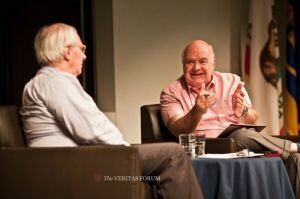Ready to give an answer
Faith
Students anxious to present an intellectual defense of their faith spur renewed interest in apologetics

More than 1,000 people squeezed into a lecture hall at the University of California Los Angeles last year to hear two professors discuss the validity of Christianity. Believers are scarce on the secular campus, but a group of students anxious to present a logical, intellectual defense of their faith are engaging nonbelievers in discussions about religion and philosophy. In a place where sidewalk evangelism likely would fall on deaf ears, the UCLA Christians are using apologetics to reach a hostile audience.
Last year's symposium, hosted by The Veritas Forum, generated so much buzz on campus that organizers had to turn away about 200 students because they ran out of seats in the auditorium. Even the Alliance of Skeptics and Secularists, the only agnostic organization on campus, enthusiastically promoted the event. Audrey Chen, the UCLA Veritas Forum chapter director, said the event showed the entire campus that Christians are not afraid to have rational discussions about their faith: "It shows how Christianity is something to engage."
Organizations that emphasize apologetics, like The Veritas Forum and Ratio Christi, are gaining popularity on both secular and Christian campuses where young believers are hungry to take a more intellectual approach to their faith and learn how to appeal to skeptics who say thinkers cannot be Christians. Other groups, like Summit Ministries, Stand to Reason and Worldview Academy, offer training curriculum, retreats and camps for students who don't have access to apologetics training on campus.
James Henderson, biblical studies professor at Regent University, attributes a renewed interest in apologetics to a previously lackadaisical attitude toward faith and the desire among young Christians to give an effective answer to questions about their faith. Henderson believes that many evangelical churches have "aligned themselves with a culture of American pragmatism," and now feel it is time to take back what they think has been stolen by the post-modern world, he said.
Today, many people are looking for truth in a culture where good answers are hard to find, Henderson said. Young Christians understand that and want to be prepared to share their Christian worldview.
"When people ask, we want to give answers," Henderson said.
A group of students, faculty and ministers, led by Kelly Monroe Kullberg, started The Veritas Forum at Harvard University in 1992 in response to a spiritual void on campus. The group's members believed that many universities, including Harvard, failed to address important questions. They wanted to use apologetics - a systematic defense of Christianity - to frame a discussion about universal questions about life, death and ultimate meaning.
Unlike other campus Christian organizations, The Veritas Forum does not meet on a weekly basis for Bible study or worship. The group's main purpose is to organize intellectually stimulating discussions at least once a year.
During the last 20 years, The Veritas Forum has expanded around the world and now partners with more than 60 schools. Its UCLA chapter plans, hosts and coordinates conversation events, seminar series, and forums throughout the year. Next month, it will facilitate a discussion about suffering - one of the most difficult topics people face every day. The group's willingness to address difficult questions and engage a variety of viewpoints appeals to the school's intellectuals, Chen said: The Veritas Forum "sits on the bridge of something that students are very comfortable with."
Ratio Christi, also uses apologetics as a platform for sharing Christ. The group's goal is to create an atmosphere that will stir discussion in a setting in which agnostics, skeptics, Christians, Jews and Muslims alike will feel safe to vocalize their worldview.
The organization began in the spring of 2008 as the Reasonable Faith Apologetics Club at Appalachian State University, in Boone, N.C. Students Randy Hardman and Meridith Cheek founded the club after realizing the need to address serious intellectual questions about Christianity raised in the university setting.
Although Ratio Christi does partner with churches to host apologetics events for adults, its main focus is on college campuses. During the last year, Ratio Christi has grown from 12 to 65 chapters on campuses across the country. While the numbers have increased drastically, many of the chapters are still in the developing stages.
When it started, the group focused on reaching out to secular universities. But its leaders are now planting chapters at Christian schools, including Campbellsville University in Campvellsville, Ky., Central Bible College in Springfield, Mo., Dallas Baptist University, and Southwest Baptist University, in Bolivar, Mo.
Ratio Christi President Rick Schenker said interest in the clubs grew without much promotion: "This hasn't been a huge effort for us; we just made the decision to allow it, and we started getting interest."
Unlike Veritas Forum groups, Ratio Christi chapters meet weekly to discuss a pre-selected topic. Several trained students with prepared answers help guide the discussion. The chapters also promote evangelism, provide a place for discipleship training and organize an annual campus-wide debate.
Apologists have two specific purposes, Schenker said: "To strengthen the faith of the believers, but also to reach out to skeptics and agnostics." Ratio Christi is committed to educating people in apologetics so that they can have an educated conversation, Schenker said.
Later this month, the Ratio Christi chapter at the University of North Carolina at Greensboro plans to take apologetics to the agnostics. A team of the group's members will attend the Reason Rally, in Washington D.C., the largest secular gathering in the country. The event is designed to promote reason without religion, but the UNCG students plan to make a strong case for Christ, something skeptics often appreciate, Schenker said: "Atheists love it when we engage them in conversation."
